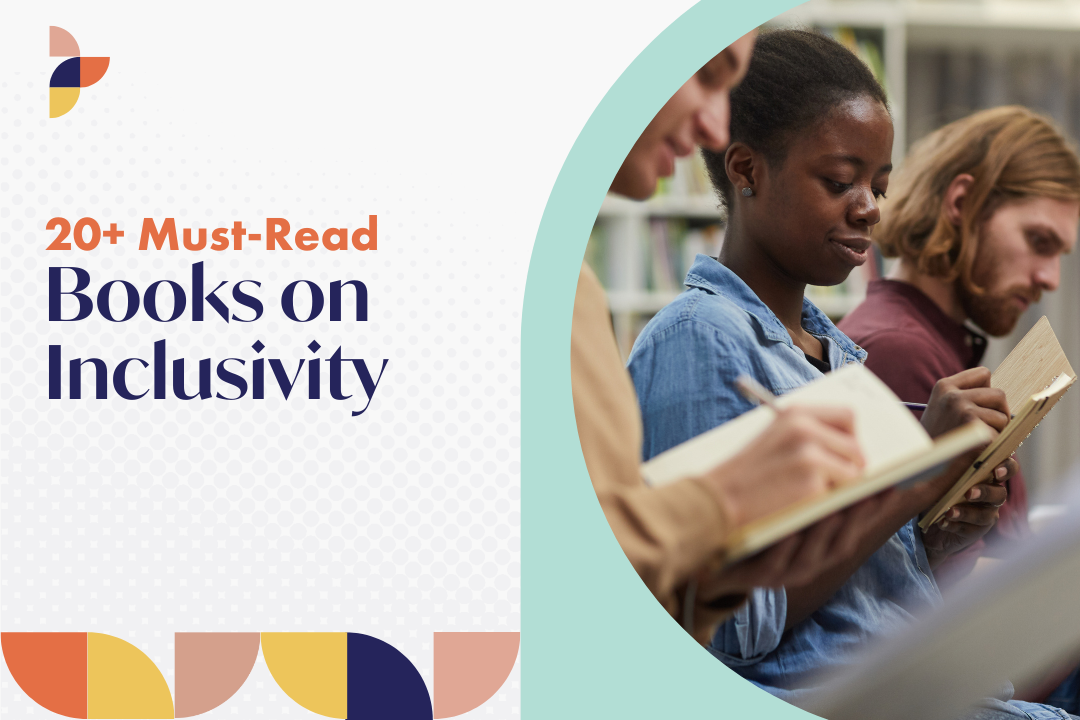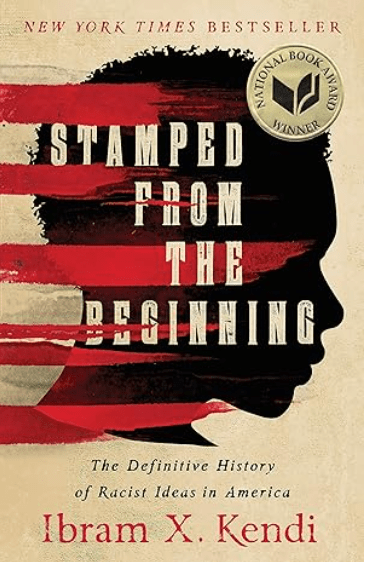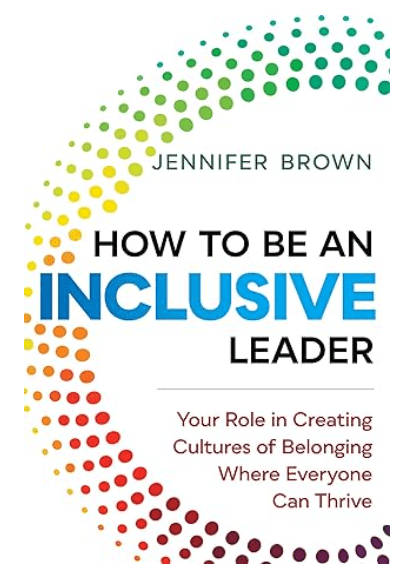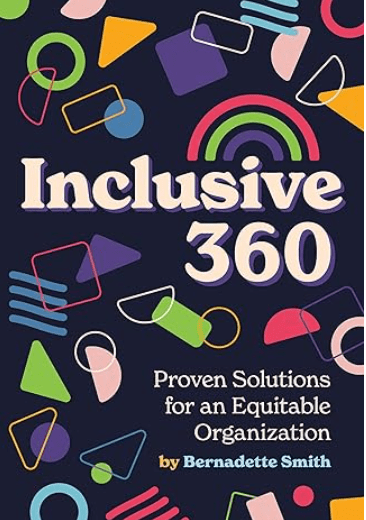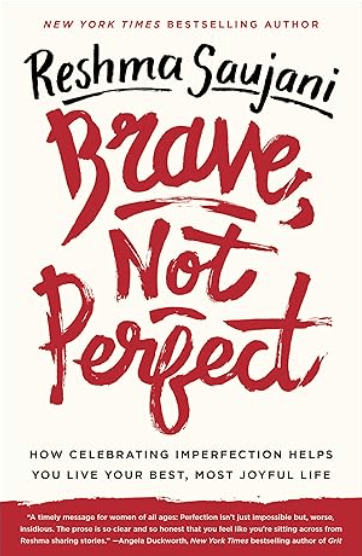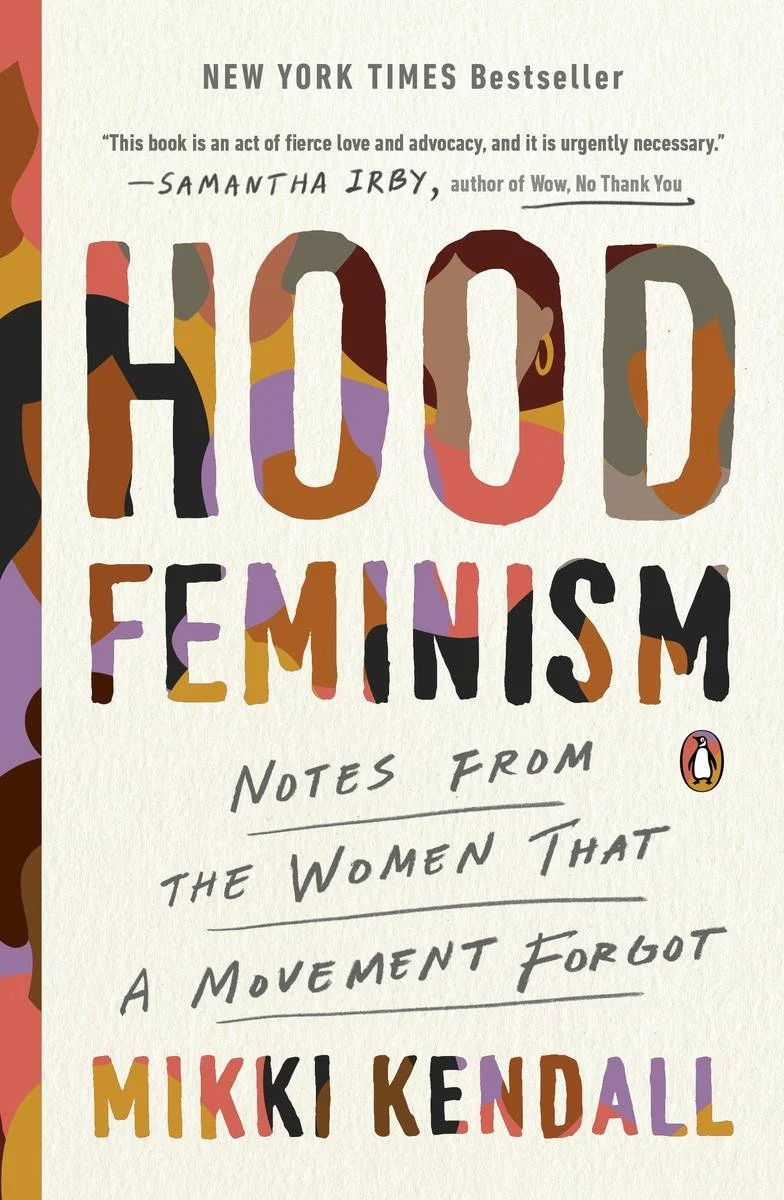20+ Must-Read Books on Inclusivity
Inclusivity work isn’t just about policies, training, or strategic plans. It’s about perspective and asking: What have I missed? Many stories related to marginalized and underrepresented groups are overlooked and pushed aside, intentionally or not.
This is where books come in. The right read at the right time can challenge your assumptions, deepen your empathy, and give you the language you’ve been searching for.
Whether you’re a team leader, HR professional, or just someone seeking to do better in your everyday life, these reads offer more than just education, but additional clarity, context, and a call to action.
What Are Books on Inclusion?
Books on inclusivity are here to help us understand people by exploring topics such as:
Identity
Power
History
Belonging
Race
Gender
Disability
Unconscious Bias
Privilege
Organizational Change
These topics shape how we live and work together, as well as how we treat the people around us.
What Kinds of Inclusivity Books Are Out There?
Inclusivity isn’t really a genre however, but a lens through which books are written with. This means you’ll find insights across all kinds of books, including:
1. Personal Narratives
Memoirs and autobiographies that center around lived experience. These are perfect to put us in the mindset of the writer, and help build empathy and understanding that we may not encounter every day.
2. Workplace and Strategy Guides
Practical, often well-researched books focused on inclusive leadership and HR policies, team dynamics, and inclusive implementation.
3. Fiction with Inclusive Themes
Novels belong here too! Fiction can still challenge assumptions and open hearts in ways that nonfiction cannot. A well-written story stays with you, sometimes even more than statistics ever can.
4. Social Science and Psychology
These dig into the how and the why behind bias, power structures, and social behavior. Oftentimes these non-fiction books are ideal for data-minded folks.
5. Essays and Cultural Critiques
These are shorter form writing samples that cut deep into a variety of issues. They might ask hard questions about history, responsibility, and accountability. Often, these books are not comfortable reads, and aim to shift our mindset.
Each type of book brings something different to the table. Whether you want stories, strategies, or a mirror held up to society, there’s a book that will speak to you.
20+ Must-Reads on Inclusivity
📖 Books on Bias and Identity
These are books that break down how bias works, how identity is shaped, and how systems influence our behavior, often through a social science or psychological lens.
1) Between the World and Me
by Ta-Nehisi Coates
This is a nonfiction book structured as a letter from the author to his teenage son and addresses themes of identity and systemic racism in the United States. It explores the author’s experiences from Howard University, to the Civil War, from living in the South Side of Chicago to Paris.
Named as one of the most influential books of the decade by CNN and one of the 10 best books of the year by The New York Times Book Review, Ta-Nehisi Coates’ work is a must-read.
2) Biased: Uncovering the Hidden Prejudice That Shapes What We See, Think, and Do
by Jennifer L.. Eberhardt
Authored by Dr. Jennifer Eberhardt, one of the world’s leading experts on unconscious bias, this book explores racial bias in all levels of society, from neighborhoods, to schools, workplaces, and the criminal justice system.
Drawing on her expertise, Dr. Eberhardt shares insights gained from assisting organizations to address bias.
3) Invisible Women: Data Bias in a World Designed for Men
by Caroline Criado Perez
Winner of the 2019 McKinsey Business Book of the Year Award, "Invisible Women" by author Caroline Criado Perez sheds light on the pervasive gender bias present in data and its far-reaching consequences on women's lives.
The book discusses how data shapes resource allocation and decision-making across crucial areas, including economic development, healthcare, education, and public policy. The failure of data to account for gender differences results in women bearing the costs in terms of time, money, and, at times, their very lives.
Caroline Criado Perez leaves readers with impactful statements, such as, “There is no such thing as a woman who doesn’t work. There is only a woman who isn’t paid for her work.” The book is a compelling exploration of the critical intersection between gender, data, and societal structures, urging readers to consider the implications of biased data on the lives of women.
4) White Fragility
by Robin Diangelo
This New York Times best-selling book delves into the phenomenon of white fragility, which is racial discomfort exhibited by some white individuals when confronted with discussions about their racial privilege. This discomfort often manifests as behaviors like anger, fear, and guilt. These behaviors hinder productive conversations about racism and ultimately perpetuate racial inequality.
The thought-provoking narrative of this book encourages readers to engage in self-reflection, prompting an examination of their own roles within the framework of racism. Furthermore, the author provides practical tools aimed at fostering constructive conversations about bias and race.
5) Stamped from the Beginning: The Definitive History of Racist Ideas in America
by Ibram X. Kendi
A recipient of the National Book Award, "Stamped from the Beginning" offers a comprehensive historical analysis of the evolution of racist ideas in America. Authored by Ibram X. Kendi, the book sheds light on the persistent and evolving nature of racism in the United States.
Kendi delves into the life stories of five influential American figures — Puritan minister Cotton Mather, Thomas Jefferson, abolitionist William Lloyd Garrison, sociologist W.E.B. Du Bois, and activist Angela Davis — to explain the complex history of anti-black racist ideas. By weaving together the narratives of these individuals, the book provides a thorough understanding of the development and persistence of racial biases.
In the words of the author, "Racist ideas were built to last. Let’s start tearing them down," suggesting a call to action to confront and dismantle ingrained racist ideologies.
6) “You Just Need to Lose Weight” and 19 Other Myths About Fat People
by Aubrey Gordon
Gordon’s book aims to bust myths that lead to anti-fat bias and the weight-based discrimination. Drawing from her lived experience and research, she breaks down 20 common myths about fat people and explores how fatphobia intersects with systems of oppression, racism, ableism, and sexism.
Additionally, she writes about how anti-fat biases are woven into healthcare, the workplace, and everyday interactions. Her voice is compassionate, unflinching, and invites readers to question their own biases and shift their viewpoint.
🥇Books on Workplace Inclusion and Leadership
Actionable guides and leadership-focused books that help you move from intention to implementation—especially in professional settings.
Author Jennifer Brown advocates for inclusive workplaces, explaining that they not only empower individual employees to reach their fullest potential but also enhance overall organizational engagement and performance.
In this book, Brown offers a practical guide designed for leaders at any level. This guide leads them through the Inclusive Leader Continuum, a four-stage model consisting of unaware, aware, active, and advocate stages.
By breaking down the journey into these stages, Brown provides a simple step-by-step framework that individuals can apply to their roles. The simplicity of these steps proves that anyone can and should take proactive steps to become an inclusive leader.
Authored by Mary-Frances Winters, founder of The Winters Group, a prominent DEI consulting firm with 36 years of experience, this book challenges leaders to establish a safe environment for employees to engage in discussions about polarizing topics as avoidance is no longer a solution.
The book offers practical and actionable strategies for addressing sensitive subjects such as race, religion, and politics within the workplace. It argues that it’s not what is talked about, but how the conversation is approached that matters.
By providing insights and tools, the book empowers leaders to navigate these challenging discussions effectively which leads to a more productive, engaging, and inclusive workforce.
Author Ruchika Tulshyan advocates for a deliberate intersectional approach to creating an inclusive workplace culture, placing emphasis on addressing the workplace discrimination faced by women of color.
In her advocacy, Tulshyan urges leaders to leverage their privilege to identify and expose biases, providing insights on how to construct an inclusive workplace.
She employs compelling storytelling and practical frameworks to illustrate the steps necessary for building a workplace that embraces diversity and actively works against discrimination.
10) Better Allies: Everyday Actions to Create Inclusive, Engaging Workplaces
by Karen Catlin
Written by former Adobe CTO, Karen Smith Caitlin, this book is a one-stop manual for individuals aspiring to become better allies and champions for marginalized colleagues in the workplace.
Caitlin walks readers through 6 steps: attracting and hiring a diverse workforce, creating an environment where employees feel welcome and supported, advocating for others, providing constructive performance feedback, using inclusive language, and organizing inclusive events.
Read this highly acclaimed guide as a first step to creating a culture where everyone is empowered to thrive.
11) The Remix: How to Lead and Succeed in the Multigenerational Workplace
by Lindsey Pollak
"The Remix," authored by leading expert Lindsey Pollak, emphasizes the significance of organizations embracing workplaces where multiple generations coexist. In environments with a diverse range of workers, spanning Millennials, Gen Z, Baby Boomers, and Gen X, varying attitudes, expectations, and working styles converge.
Pollak draws on her expertise, sharing data from her research and offering case studies from Fortune 500 companies. The book outlines strategies for leaders to address diversity clashes within generational differences and, importantly, provides insights on leveraging this generational diversity as a business opportunity.
By acknowledging and navigating the unique strengths of each generation, organizations can harness the collective power of diverse perspectives to drive innovation and success.
12) Inclusive 360: Proven Solutions for an Equitable Organization
by Bernadette Smith
In "Inclusive 360," author Bernadette Smith offers a thorough roadmap full of ideas from the world's most innovative companies.
This guide is designed to aid organizations in their journey toward greater diversity, equity, and inclusion through impactful actions.
The book provides strategies that extend beyond HR, emphasizing that every department within an organization plays a crucial role in creating more equitable workplaces.
13) The Waymakers: Clearing the Path to Workplace Equity with Competence and Confidence
by Tara Jaye Frank
In "The Waymakers," equity strategist Tara Jaye Frank employs case studies, data, and storytelling to illustrate how leaders can pave the path to workplace equity.
The book emphasizes that success and a sense of belonging in one's career often result from leaders who actively remove barriers and guide their team members toward their goals.
Frank's work serves as a guide for leaders, providing insights on how to facilitate necessary change. It encourages leaders to assess their position on the equity journey, understand the true desires of their employees, and embody principles that allow them to consistently show up as leaders who actively pave the way for others.
🧠 Personal Narratives & Memoirs
These are the honest, unfiltered stories from everyday people. They offer the kind of perspective that policy manuals never could: lived, felt, and resilient. If you want to understand what inclusion feels like from the inside, start here.
In his inspirational book, author John Samuel opens up about his transformative journey after being diagnosed with a degenerative eye disease. Faced with the challenge of finding a sense of belonging in a world that often overlooks individuals with disabilities, Samuel shares his profound insights and experiences.
The book delves into Samuel's perspective as someone who is visually impaired, exploring his daily challenges and offering guidance on embracing disability as an advantage to achieve one's dreams.
Samuel emphasizes the value that individuals with disabilities bring to organizations and provides insights on how anyone can become an ally in breaking down barriers. Additionally, the book offers practical guidance on implementing a disability inclusion strategy, making it a valuable resource for rebuilding a more inclusive and accessible world.
In her book "Brave, Not Perfect," Reshma Saujani, the founder of Girls Who Code, urges women to overcome the fear of failure that often prevents them from pursuing their passions.
Saujani explores the societal factors that contribute to women's tendencies to be people pleasers and fear failure, touching on norms that reinforce praise for being quiet and polite.
"Brave, Not Perfect" offers practical tools and insights to empower women to break free from stereotypes and the pursuit of perfection. Positioned as an inspirational read for girls and women of all ages, the book encourages a shift in mindset, advocating for bravery over perfection in the pursuit of personal and professional goals.
16) We Have Always Been Here
by Samra Habib
Winner of Canada Reads and longlisted for the RBC Taylor Prize, We Have Always Been Here is a powerful memoir that explores the intersections of faith, sexuality, gender, and displacement.
Born in Pakistan and raised in a conservative Muslim household, Habib tells the story of her identity as a queer Muslim woman through the lens of resilience, community and self-discovery.
We Have Always Been Here is more than a coming-out story. It’s a call to create space for those whose identities exist at complex, overlapping margins.
17) Hood Feminism
by Mikki Kendall
In Hood Feminism, Kendall critiques mainstream feminism’s failure to center the needs of women who are Black, poor, disabled, or otherwise marginalized. Told through essays that are partly personal and partly political, she argues that true feminism must include issues like housing, gun violence, education and food insecurity.
Hood Feminism is a must-read anyone who wants to move beyond equity theory and into equity as an every day practice.
18) Minor Feelings
by Cathy Park Hong
A finalist for the Pulitzer Prize and named one of Time’s 10 Best Nonfiction Books of the Year, Minor Feelings is a collection of essays that unpacks the complexities of Asian American identity, language, and visibility.
Drawing on her experiences as a poet, daughter of Korean immigrants, and woman navigating racialized spaces, Hong explores the dissonance between how Asian Americans are perceived and how they experience the world. Her cultural critique is sharp, deeply personal, and layered with dark humor and personal storytelling.
🔍 Tools for Self-Reflection & Growth
These reads are not so much about fixing others and more about unlearning what you thought you knew, especially around bias, privilege, and perspective.
19) Blindspot: Hidden Biases of Good People
by Mahzarin R. Banaji and Anthony G. Greenwald
Many think that they know their own minds and can assess others in a fair and accurate way. In Blindspot, leading psychologists, Mahzarin R. Banaji and Anthony G. Greenwald, challenge these beliefs by exposing the hidden biases ingrained in individuals due to societal attitudes towards characteristics such as age, gender, and race.
The authors delve into the concept of unconscious bias, drawing on studies conducted using the Implicit Association Test. This fascinating test measures the strength of an individual's associations with certain concepts, unveiling subconscious biases that may not be readily apparent.
Blindspot seeks to help its readers gain awareness and outsmart our brains so that we can challenge our own biases and make fairer evaluations in our daily lives.
20) The Person You Mean to Be
by Dolly Chugh
Social psychologist Dolly Chugh offers a practical, research-backed guide to navigating bias, privilege, and allyship in everyday life. Rather than aiming for perfection, Chugh encourages readers to become “good-ish” people. What does that mean? It means being willing to grow, learn and confront uncomfortable truths.
She takes both behavioral science and personal anecdotes and breaks down how well-meaning individuals often fall short in the moments that truly matter, and how to course correct with intention.
Chugh equips readers with tools to better understand their blind spots, speak up when it counts, and turn values into action.
In her book "Say More About That," inclusion strategist and expert Amber Cabral provides communication tactics and toolkits for assertively addressing unfair treatment in various contexts, including work, home, and school.
The book delves into the fundamentals of inclusion and equity, exploring the concept of allyship. It examines the challenges of speaking up in our social environment and offers effective language and strategies to stand up against unfair treatment.
"Say More About That" aims to empower readers with the confidence to push back against unacceptable behavior, such as passive-aggressive actions and professional gaslighting. By providing practical insights, the book serves as a valuable resource for individuals seeking to advocate for themselves and others in the face of inequity.
🛠️ Practical & Professional
These books are here to help leaders, builders and strategists ready to embed inclusion into the core of what they do.
22) Building For Everyone: Expand Your Market With Design Practices From Google’s Product Inclusion Team
by Annie Jean-Baptiste
The Head of Product Inclusion at Google, Annie Jean-Baptiste shares valuable insights and strategies on the inclusive design process employed by Google to develop user-centric and profitable products. Her book addresses the diversity of markets and how businesses can unlock revenue potential by creating products that truly meet the needs of their diverse user base.
Focusing on the "how," Jean-Baptiste provides readers with insights into essential questions that should be asked about D&I in product development. The book draws on research and case studies to illustrate effective practices, introduces the ABCs of product inclusion, and offers guidance on how to apply these strategies within an organization.
Whether in product design, marketing, management, or other roles, the concepts presented in the book are designed to be applicable and beneficial for a wide range of professionals.
In "The Culture Map," international business expert Erin Meyer draws on her extensive experience living and working in Africa, Europe, and the United States to share insights into communication patterns and business operations worldwide.
Recognizing the increasing importance of cultural competence in the era of globalization, Meyer provides a valuable resource for navigating cultural differences in both professional and personal contexts.
The book offers an analytical framework that helps readers understand and work harmoniously with individuals from diverse cultural backgrounds. Readers are also given the chance to dive into engaging, real-life examples from around the world with important lessons on international collaboration.
Additional Resource: Podcasts Inclusivity 📻
Whether you’re just beginning your journey toward inclusive leadership or you’re looking to deepen your understanding of bias, belonging, and equity, this list is a great place to start.
Pick a book, start a conversation, and keep growing.

